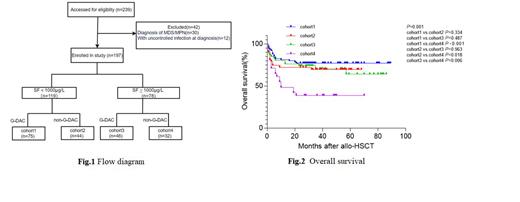Background: Iron overload is considered as an unfavorable prognosis in myelodysplastic syndrome (MDS) even in those undergoing allogeneic hematopoietic stem cell transplantation (allo-HSCT). Although iron chelation therapy has improved the prognosis of these patients to some extent, the effect has not yet been satisfactory. This study aimed to investigate whether granulocyte colony-stimulating factor and decitabine (G-DAC)-containing conditioning improve the prognosis of iron-overloaded MDS patients undergoing allo-HSCT.
Study Design: One hundred and ninety-seven patients were enrolled in this retrospective study. Based on the level of serum ferritin (SF) and conditioning regimen, all patients enrolled were divided into 4 groups: SF﹤1000µg/L with G-DAC conditioning (cohort 1), SF﹤1000µg/L with non-G-DAC conditioning (cohort 2), SF ≥ 1000µg/L with G-DAC conditioning (cohort 3) and SF ≥ 1000µg/L with non-G-DAC conditioning (cohort 4). The clinical features and prognosis between cohorts were analyzed.
Results: The 2-year overall survival (OS) was 77.0%, 72.1%, 73.8% and 38.7% ( P = 0.001), and disease-free survival (DFS) was 75.7%, 62.8%, 71.7% and 35.5% ( P = 0.001), and the cumulative incidence of non-relapse mortality (NRM) was 17.3%, 25.0%, 15.2% and 53.1% ( P = 0.001), and the incidence of relapse was 8%, 13.6%, 13.1% and 12.5% ( P = 0.592), respectively, in the four groups. To be specific, cohort4 had worse OS and DFS and higher NRM than the other three groups (all P﹤0.05). Multivariate analysis revealed that SF ≥ 1000µg/L was a risk factor for OS, DFS and NRM ( P = 0.022, P = 0.025, P = 0.036), while G-DAC-containin g conditioning was a protective factor ( P = 0.009, P = 0.003, P = 0.004). Intriguingly, when cohort 1 to cohort4 were included in the multivariate analysis, only cohort4 was a risk factor for OS, DFS and NRM (all P﹤0.05), but cohort3, namely iron-overloaded patients who received G-DAC-containing conditioning had no difference in prognosis compared with patients with SF﹤1000µg/L.
Conclusions: The poor prognosis of patients with iron overload could be overcome by G-DAC-containing conditioning partly.
Disclosures
No relevant conflicts of interest to declare.


This feature is available to Subscribers Only
Sign In or Create an Account Close Modal